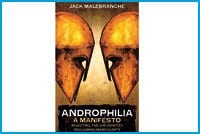Imagine a world where women are rarely seen or heard, while men are free to focus all of their attentions on other men, bonding through such manly behaviours as football, hunting, fishing and anal sex. Sound like a dream come true?
Jack Malebranche thinks so. He’s not gay; he’s a man who loves men, or as he puts it, an “androphile.” Gay men rejecting women is nothing new, but Malebranche, a Portland-based author, artist and priest of the Church Of Satan, embraces the idea whole hog in his new book Androphilia, A Manifesto: Rejecting The Gay Identity, Reclaiming Masculinity.
Homosexual males, argues Malebranche, have little common cause with the female of the species. Their natural allegiance should lie with other men, and it’s gay politics that has driven an unnatural wedge between homosexual men and our straight brethren. Gay culture — with its deference to feminist critiques of masculinity and unseemly addiction to divas like Cher — is robbing men who love men of their burly birthright.
Worst of all, gay culture encourages effeminate behaviour among men — an enormous barrier to acceptance by regular guys. Although Malebranche allows that a minority of males are truly queeny, he assures readers that the rest of us have merely picked up our embarrassing girly mannerisms through gay socialization and that these behaviours can be unlearned. RuPaul begone!
As for the organized queer movement, Malebranche rejects it as little more than a whiny special interest group, saddled with feminist baggage and pesky leftist politics. The days of genuine queer oppression, he says, are over. Maybe someone should let Mathew Sheppard’s mom know.
According to Malebranche, homosexual men must leave behind lesbians and “the confusing world of transsexuality.” Only then, free of the feminine scourge (once we’ve purged it from ourselves, of course), can we become über-males, setting a shining example for all possessing testicles.
“I envision a world where androphiles become admired as knowledgeable outdoorsmen, avid hunters, successful sportsmen, skilled builders, do-it-yourselfers, shrewd businessmen and accomplished leaders in their chosen fields,” he writes.
This vision is a fairy tale. To begin with, Malebranche underestimates the visceral antigay hostility of many straight men — especially those most often identified with the testosterone-fuelled pursuits he fetishizes. While it may be true that more and more straight guys are openly supporting their gay peers, this open-mindedness results directly from changes ignited by the very social movements Malebranche loathes.
Malebranche’s vision also rests on the notion that there are only two genders, polar opposites that have existed throughout history. That may be true in terms of archetypes, but people’s real lives have always been more complex.
While Malebranche is right that there’s no intrinsic link between queerness and coalition politics, it’s something many homos and homo organizations choose because it strengthens our positions through collaboration with those who are different from us but support common causes. In that sense, male separatism would leave us losers.
There’s little truly radical in Androphilia’s arguments, which amount to a distaste for women as much as a love for men, aversion to freedom of expression among gay men and a libertarian defence of sex acts kept behind closed doors.
Malebranche expects rejection from “mainstream” gays: “Go ahead. Blame me. Insult me… I don’t need your love, your acceptance or your approval,” he writes. Evidently, he takes himself a bit too seriously.
Though his own answers don’t stand up to scrutiny, Malebranche posits some important questions. Quoting 1980s art-rockers Devo, he asks queer males, “Are we not men?”
For some queer boys growing up, attraction to men fosters an intense sense of difference. Others always feel like one of the guys, and their emerging erotic desires seem a curious anomaly. Either way, as all gay men mature, we figure out our own relationship to masculinity — our own and that of other men. In their own way, straight males do the exact same thing. Men do have things in common and benefit from exploring them together.
Malebranche has put effort and research into the slim, well-designed book, employing historical and cultural references to bolster his arguments. But Androphilia’s rhetorical style relies too heavily on hyperbole and repetition — and an ejaculation of italics across every page. He’s clear in his conviction that androphiles need to reject a gay world consisting solely of effeminacy and female-worship — but simply saying that over and over again is unconvincing. The lady doth protest too much, methinks.
In his urgent insistence, Malebranche reminds me of a character in the classic queer outlaw novel, John Rechy’s 1963 City Of Night (cited in Androphilia). Rechy’s hustler protagonist meets Neil, a leatherman desperate to validate his own masculinity. Neil is compelled to demonstrate he’s a virile and dominant male who can overpower others. To prove it, he puts a kitten in a brown paper bag and drowns it in his bathtub.
My advice to Malebranche would be the same I’d offer Rechy’s leatherman. For everyone’s sake, please stop trying so hard.

 Why you can trust Xtra
Why you can trust Xtra


